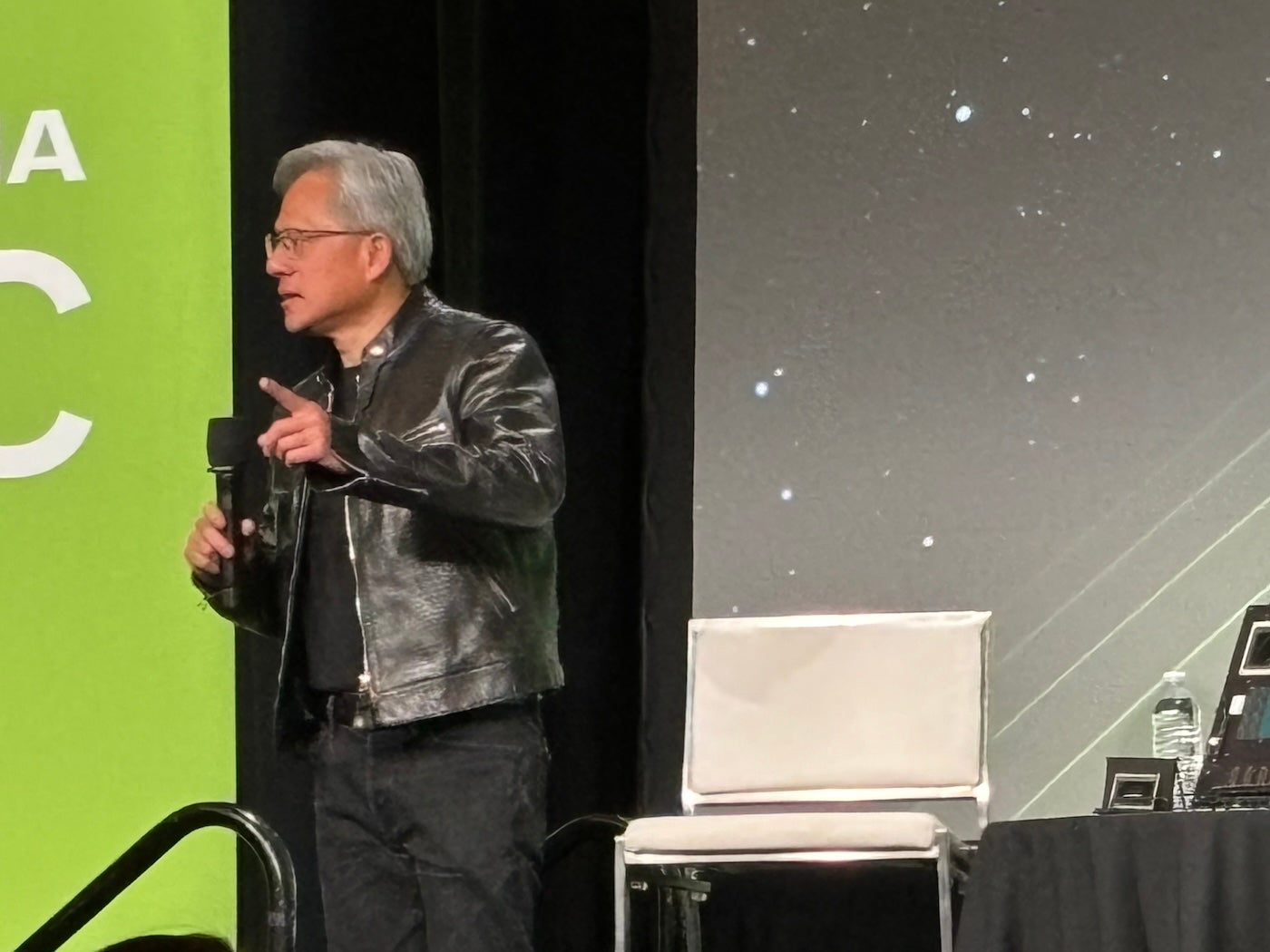With NVIDIA’s announcement of AI Enterprise 5.0 and NVIDIA Inference Microservices at the GTC conference, CEO Jensen Huang plans to begin an era of making enterprise AI deployment easier and more widely applicable than ever before – possibly while changing the main way people interact with computers.
The idea of controlling and programming computers with prompts alone is similar to what Humane has proposed with its prompt-based Ai Pin, but Huang extends it to developers and IT as well as consumers: “The job of the computer is to not require C++ to be useful,” Huang stated during the NVIDIA GTC press Q&A held March 19 in San Jose, California (Figure A).
Figure A

NVIDIA CEO Jensen Huang speaks during a press Q&A during NVIDIA GTC in San Jose, California on March 19. Image: Megan Crouse/TechRepublic
Huang: Prompt engineering is transforming programming
When asked whether programming will remain a useful skill in the age of generative AI prompts, Huang said, “I think that people ought to learn all kinds of skills,” and compared code to juggling, playing piano or learning calculus. However, Huang said, “Programming is not going to be essential for you to be a successful person.”
SEE: Huang announced a wide range of NVIDIA products for data centers, enterprise AI, cryptography and more during the GTC conference keynote. (TechRepublic)
Generative AI, Huang said, is “Closing the technology divide. You don’t have to be a C++ programmer to be successful,” he said. “You just have to be a prompt engineer. And who can’t be a prompt engineer? When my wife talks to me, she’s prompt engineering me. … We all need to learn how to prompt AIs, but that’s no different than learning how to prompt teammates.”
Huang followed up with, “But if somebody wants to learn to do so (program), please do because we’re hiring programmers.”
PREMIUM: Learn how to become a prompt engineer in this TechRepublic Premium download
Prompt engineering is a rapidly changing skill
Will prompt engineering replace traditional programming when it comes to creating generative AI from generative AI as Huang suggested?
“I would not quit my day job just yet to become a prompt engineer,” said Gartner analyst Chirag Dekate in a call to TechRepublic on March 19. “Unfortunately the market is over-correcting.”
And the market is over-correcting to a surge in demand for what prompt engineering used to look like. In the rapidly changing industry, optimizing prompts to get an AI to output the right text may no longer be the way AI prompt engineering is done; instead, prompts may be multimodal.
NIMs are remarkable, Dekate said, because they fit generative AI neatly into the hybrid multicloud context in which many enterprises operate. “What NVIDIA is now building is a foundation for next-generation, AI-native enterprises where everywhere enterprises are going to turn they are going to experience NIM,” he said.
However, NVIDIA may not be the company to make the transformation happen. Dekate pointed to Cognition AI, which last week introduced Devin, its “AI software engineer,” as a sign that the way software engineering is done may change in the future.
No matter whose name ends up on the most common software, Dekate said the way developers interact with generative AI is bound to change quickly.
“The pace of innovation of generative AI continues to accelerate,” said Dekate. “Chances are, we will not be interacting with any of these models using our legacy perceptions. I’m talking about three-month-old or six-month-old technology as legacy. Generative AI changes that fast.”
David Nicholson, chief research officer at The Futurum Group, told TechRepublic by email that in a generative AI future “a facility with human language becomes an important computer science skill.”
“Your degree in English (or) history or law suddenly helps you become a prompt engineer, but an actual computer science minor will never hurt,” Nicholson wrote. “It’s not NVIDIA hype. It’s truly a revolution.”
Disclaimer: NVIDIA paid for my airfare, accommodations and some meals for the NVIDIA GTC event held March 18 – 21 in San Jose, California.


